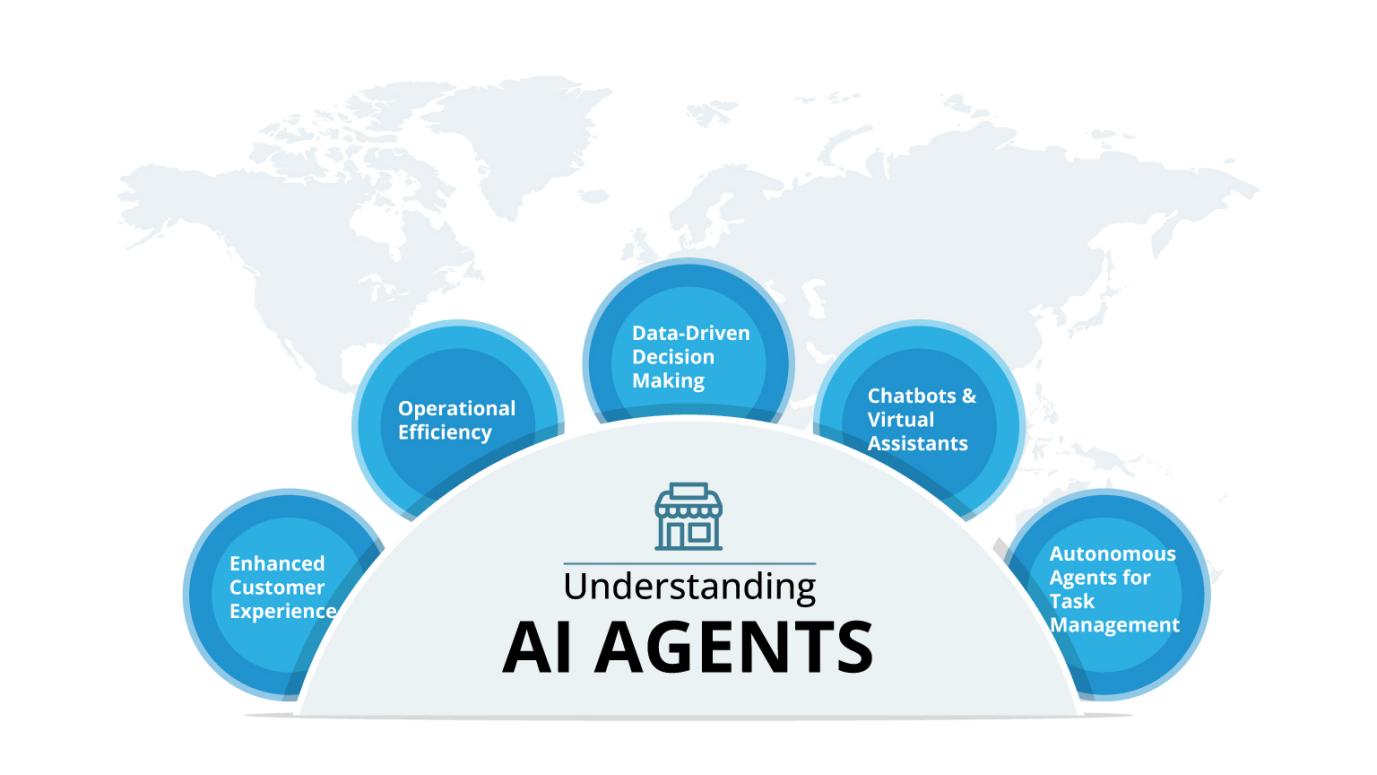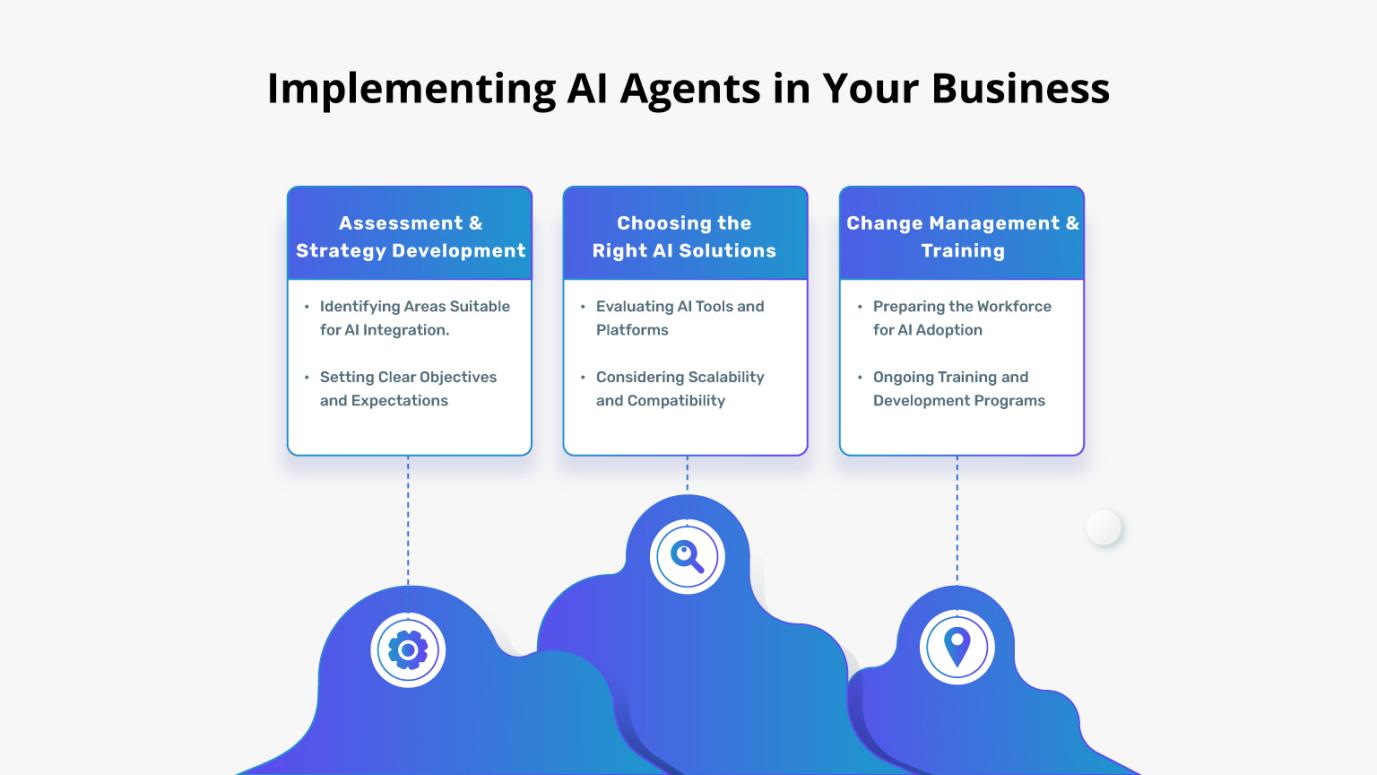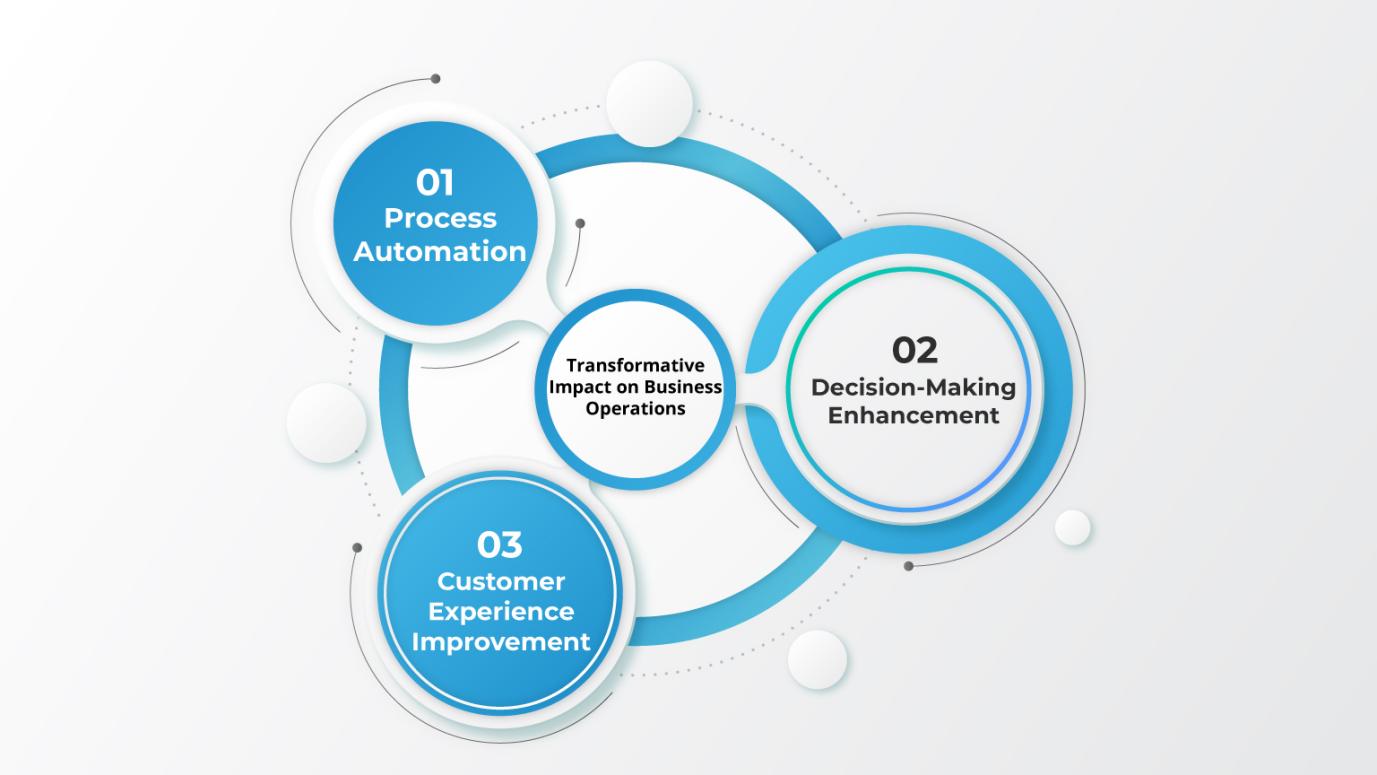Harnessing AI Agents: Transforming Business Operations with Intelligent Automation

Artificial intelligence agents: These are standalone software agents that are built to accomplish a task on behalf of users or for other systems, as possible with little human interaction. They see their surroundings, process the input, decide how to do it, and act to achieve the goals intended. AI agents differ from conventional automation tools since they use machine learning algorithms to learn and develop based on step-by-step improvement. That enables them to apply complex and dynamic tasks.
Understanding AI Agents

AI agents’ integration in existing business activities offer the following benefits.
- Enhanced Customer Experience: Analytical analysis makes the AI agent familiar with the behavioral pattern of the customer, and it therefore suggests individual recommendations and fast response to further facilitate engagement and loyalty from customers.
Amazon Web Services, Inc. - Operational Efficiency: Dedicated free time for human workforces in repeated manual work for long-term strategy executions that save operational costs with productive outcomes. Wikipedia
- Data-Driven Decision Making: AI agents can handle huge amounts of data for patterns and insights that help facilitate the process of making informed decisions. Wikipedia
Examples of AI agents in business applications include:
- Chatbots and Virtual Assistants: Microsoft Copilot Chat enables businesses to reply to customer questions and provide details. This ensures efficient communication. Reuters
- Autonomous Agents for Task Management: AI agents will perform tasks such as scheduling meetings, email management, and market research that decrease the administrative workload of the employee.
The Verge
The adoption of AI agents is altering the workplace in new “superworkers” that focus on employees leagued up by their development to enhance the productivity and quality of work. Transformation calls for this creation of new roles and responsibilities thus requiring a workforce to upscale and be versatile.
Transformative Impact on Business Operations
However, the injection of AI agents has raised job displacement, ethical concerns, and reliability about autonomous systems. While AI agents have a lot to offer, business has an inherent responsibility to raise or face the challenges to implement or deploy the agents responsibly and effectively.
AI agents have been a revolution in intelligent automation, which, in the long run, is here to change the operations of a business in matters of efficiency, improved customer satisfaction, and better decision-making. Therefore, with changing technology, their role is here to shoot up myriad times, and the integration of these tools, therefore, for the organization has to be strategic along with the difficulties associated with it.
Artificial Intelligence agents make businesses run more smoothly by making things easier, better decisions, and good customer experience. This cuts across any kind of business, raising efficiency, accuracy, and customer satisfaction.
A. Process Automation
AI-driven process automation frees up staff to focus on strategic work and enables them to deal with routine transactions. Shadow chancellor of the UK Rachel Reeves will, as an example, use an AI tool that has categorized Treasury emails into ones that require priority attention or high-risk communications so that she can attach a standard reply to routine questions. That saves hours of hand work each day
RPA in companies such as UiPath increases operations in the industrial sector with its efficiency. This study of the company shows an obvious improvement in the accuracy and the processing time of the different industries.
B. Decision-Making Enhancement
AI agents play a crucial role in data analysis, providing predictive insights that support strategic planning and operations. For instance, private-credit firms use AI technology more frequently to analyze deals and develop strategies for investment. AI models shorten the time for deal analysis, increase productivity, and help build a competitive edge in the nonbank lending market.
WSJ
Furthermore, AI is applied in scenario analysis that enables it to model different scenarios that help in strategic decision-making. For example, a logistics company can apply AI to simulate varied delivery routes if the weather condition changes in an efficient manner as well as in optimizing resource utilization.
C. Customer Experience Improvement
AI agents improve customer interactions by giving them personalized and timely responses. Businesses use AI-powered chatbots and virtual assistants to answer inquiries, providing 24/7 support and quick resolutions. This continuous availability leads to higher customer satisfaction and loyalty.
University of San Diego Online Degrees
H&M makes use of generative AI in which they discuss the current fashion trends and tastes prevailing in the market and then generate that kind of clothes. It ensures that individual tastes are identified in those styles so that customers may get better experiences on their side.
Incorporating AI agents into business activities helps to automate the process, improve decision making, and offer better experiences to customers. Further development in terms of technology by AI will make transforming business practices through AI even more dynamic and open new avenues for efficiency and growth.
Implementing AI Agents in Your Business

Implementation of AI agents in business activities requires strategic considerations to achieve seamless integration and optimum benefits. This process can be divided into three main phases.
A. Assessment and Strategy Development
- Identifying Areas Suitable for AI Integration: This begins with the analysis of business processes to identify time-consuming, data-intensive, and repetitive tasks best suited for AI application. For example, routine tasks can be done by AI agents that will analyze data and prepare drafts of first content so that employees have to strategize and create. Social Media Examiner
- Setting Clear Objectives and Expectations: Determine what AI is going to make a company attain its goals-whether it works more efficiently or cost-efficiently or gives it better customer services. Developing measurable results will pave the way into the integration process and provide an accomplishment measure. Such successful companies that implement these technologies, like AI, have already gained much better returns-from the case of Accenture’s AI-implementation revenue overshooting OpenAI’s access provision. The Times
B. Choosing the Right AI Solutions
- Evaluating AI Tools and Platforms: Evaluate the available AI products for functionality, how easy they can be deployed into your applications, and vendor support. For instance, Telstra has entered a partnership with Accenture in order to expedite the AI deployment process. Both combined their expertise to help simplify processes and ensure maximum use of data. The Australian
- Considering Scalability and Compatibility: Choose AI tooling that matches a scalable growth level of your company and can assimilate into all existing systems smoothly. This minimizes disruption due to system non-compatibility of the AI offerings. The appointment of a separate AI engineering team, CoreAI, by Microsoft is one aspect of making strong inroads in the deeper integration of its tools and other platforms with the AI capabilities. The Verge
C. Change Management and Training
- Preparing the Workforce for AI Adoption: Communicate the benefits and implications of AI integration to employees, which will create acceptance and lower resistance. Let them know that AI agents are designed to help, not replace human roles. They are good teammates that can bring real value to the teams they support. BCG Global
- Ongoing Training and Development Programs: Continuous training and development programs Engage continuous learning opportunities that take employees to work effectively with AI agents. That ranges from learning of new tools up to readjustment of their workflows. Making the workers confident in handling the AI as efficiently as they require is crucial. According to the UK’s AI Opportunities Action Plan, this can propel economic growth.
Challenges and Considerations

An organization would be able to integrate AI agents effectively in improving operation by systematically assessing the needs of an organization, providing suitable AI, and preparing an effective workforce via appropriate change management and training.
Great benefits are accrued when AI agents are installed within business operations. However, this brings about a number of challenges and implications that need to be addressed. Challenges to be addressed will be indispensable to successful implementation of AI integration.
A. Data Privacy and Security
- Ensuring Compliance with Regulations: An organization has to adhere to data protection regulations. In the European Union, for example, there is GDPR, while in the United States, it is CCPA. The guidelines for collecting, processing, and storing data will be quite stringent; thus, businesses must ensure that adequate compliance measures are put in place. For example, GDPR requires an organization to seek explicit consent before processing any personal data, but at the same time, an individual should be allowed access to and delete their data. OVIC
- Protecting Sensitive Business and Customer Data: AI systems normally process large quantities of sensitive data, such as personal, financial, and health data. Thus, encryption, access controls, and security audits should be robust enough to prevent breaches and unauthorized data access. For instance, healthcare organizations should ensure that the health data privacy laws are adhered to while using AI applications. PMC
B. Ethical Implications
- Addressing Potential Biases in AI Algorithms: When AI algorithms work, they also inadvertently tend to carry forward biases and prejudices reflected in the data set used for training and thus perpetuate outcomes not fair or even perhaps discriminating. Organizational datasets must include diversity and must represent society properly through regular audits of biases, together with fairness and algorithms being placed into these practices. Tools on recruitment need especially to be programmed with great care to avoid discriminations based on race, gender, or any such protected attribute during the selection and hiring processes of employees. OVIC
- Maintaining Transparency and Accountability:AI decision-making processes are usually opaque, and hence the results are difficult to understand as to how they are derived. Developing explainable AI models and proper documentation of functionalities and limitations of AI systems falls under transparency. Transparency is key to building trust with stakeholders and ensures accountability, especially in healthcare and finance, where decisions made can drastically change people’s lives.
PMC
C. Cost and Resource Allocation
- Evaluating the Investment Versus Return: In simple words, one needs to compare the amount invested with the returns it generates. Implementing AI solutions involves huge investment in terms of technology, infrastructure, and talent. An enterprise needs to compare cost-benefit to evaluate the probable ROI from such an investment. Both tangible returns may include efficiency and revenue growth, and intangible returns may comprise improved customer satisfaction and relative competitive advantage. For instance, a firm might invest in AI to automate a customer service that saves money and improves customer experiences.
- Allocating Resources for Implementation and Maintenance: After implementing the AI system, there are other post-implementation processes involved with continuous updating, monitoring, and troubleshooting. Resources are, therefore, fundamental to the effective continuity and efficiency of the solutions in the long run. This needs involving data scientists as well as AI engineers to the environment of process support that enhances continuously according to the evolution of emerging needs in the company. Lastly, they should clearly explain how this AI will be part of the existing framework and process of the firms so the positive effects could be amplified.
Future Trends and Opportunities

Although AI agents are said to have the potential to transform a business, several concerns need to be addressed: about data privacy and security, ethical aspects, and resource utilisation. Proper compliance measures with the integration, fairness, transparency, and careful analysis of investments could help companies successfully navigate these concerns and fully realise the benefits from AI integration.
With an ever-changing form, AI agents are changing extremely fast, carrying vast potential over numerous industries and sectors. Now, it comes with advancing capabilities of AI which promise to revolutionize business operations and social intercourse
Advancements in AI Agent Capabilities
This last development has genuinely made AI agents very powerful indeed. They are doing lots of really complex things completely on their own and in far more efficient manners than was conceivable earlier with the other AI systems which only provided the information, and modern AI agents are supposed to act on behalf of their user which may make reservations or collect some information.
These agents are getting more adept in understanding and processing natural language. They can process massive data to offer predictive insights that help in the most crucial part of decision-making. AI agents also become adaptable. They learn through interactions to make their performance improve over time.
Emerging Applications Across Various Industries
AI agents are increasingly being incorporated into diverse sectors, leading to innovative applications:
- Customer Service: AI agents are transforming the face of customer support with 24/7 assistance, answering queries, and solving problems efficiently. This leads to better customer satisfaction and reduces the operational cost. BCG Global
- Healthcare: In the medical world, AI agents assist in diagnostics, patient monitoring, and treatment plans that help in the improvement of outcomes for patients and streamlines healthcare services.
World Economic Forum - Finance: AI agents are used by financial institutions to detect fraud, assess risk, and provide customized financial advice for increased security and better customer experience. World Economic Forum
- Education: AI agents help in the creation of a personalized learning experience, adaptation to the needs of the individual students, and providing real-time feedback that changes traditional methods of education.
World Economic Forum
Preparing for Continuous Evolution in AI Technologies
The rapid pace of AI development necessitates proactive preparation:
- Continuous Learning: Organizations have to invest in continuous training so that they are well-equipped with skills to work with AI technologies effectively.
California Management Review - Ethical Considerations: Ethical standards have to be set and followed in AI applications so that these technologies can be used responsibly by ensuring the issues of bias and transparency..
- Infrastructure Investment: There must be a solid technological infrastructure in place to support the integration and scalability of AI solutions.
- Collaboration and Governance: This refers to the establishment of collaboration and governance frameworks, where AI technologies are developed and deployed in ways that align with organizational goals and societal values.
Conclusion
The AI agents in most sectors promise transformative change, working towards efficiency, innovation, and customer experience. Intelligent automation is not a technology but a strategic play to achieve dominance in an increasingly digital world. The ones who will lead will take a proactive stance toward integrating AI in their ecosystem and prepare themselves for continuous evolution.
FAQ’s
1. What are AI agents in business?
AI agents are autonomous software systems that perform tasks with minimal human intervention. They perceive their environment, process data using machine learning, and make decisions to achieve specific goals. Businesses use them for roles like customer service chatbots, automated scheduling, and data analysis to improve efficiency.
2. How do AI agents improve customer experience?
AI agents analyze customer behavior to offer personalized recommendations and provide instant, 24/7 support. By handling inquiries quickly and accurately through chatbots and virtual assistants, they increase customer satisfaction and loyalty while freeing up human agents to handle more complex issues.
3. What are the main challenges of implementing AI agents?
Key challenges include ensuring data privacy and security, addressing potential biases in AI algorithms, and managing the high costs of implementation. Companies must also focus on ethical transparency and prepare their workforce for new workflows to successfully integrate these automated systems.
4. Can AI agents replace human employees?
AI agents are designed to augment human roles, not replace them entirely. They handle repetitive, data-heavy tasks, allowing employees to focus on strategic, creative, and complex problem-solving work. This collaboration creates “superworkers” who are more productive and efficient.
5. Which industries benefit most from AI agents?
Industries like finance, healthcare, retail, and customer service see significant benefits. For example, finance uses AI for fraud detection, healthcare for patient diagnostics, and retail for personalized shopping experiences. These sectors leverage AI to enhance decision-making, operational efficiency, and service quality.

